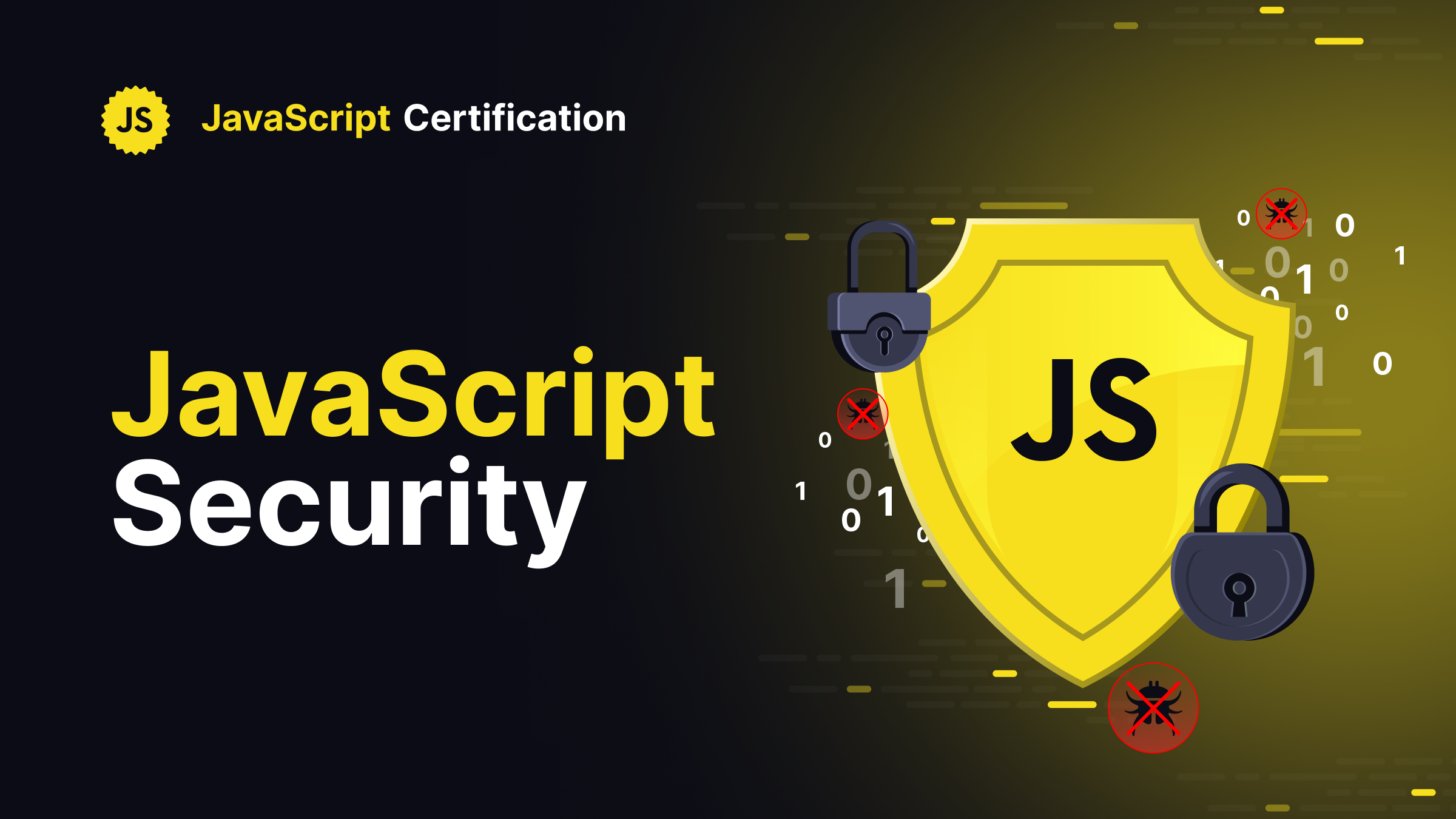
JavaScript Security: Protecting Your Applications from Modern Threats
Explore essential JavaScript security practices to protect your web applications. Learn how to prevent common vulnerabilities like XSS and CSRF, implement secure communication, manage dependencies safely, and secure client-side data storage. Improve your app's defenses against modern threats.
Daniel Kelly
September 19, 2024
As JavaScript continues to dominate web development, securing applications against modern threats has become more crucial than ever. With the increasing complexity of web applications, the attack surface has grown, making it essential for developers to understand and implement robust security practices. Let's explore common vulnerabilities in JavaScript applications and learn how to protect against them.
Cross-Site Scripting (XSS): The Persistent Threat
Cross-Site Scripting remains one of the most common vulnerabilities in web applications. XSS occurs when an attacker injects malicious scripts into content that is then served to other users.
Types of XSS:
- Reflected XSS
- Stored XSS
- DOM-based XSS
Prevention Techniques:
1. Input Validation and Sanitization
Always validate and sanitize user input before using it in your application.
// Bad: Directly inserting user input into the DOM
document.getElementById('username').innerHTML = userInput;
// Good: Sanitize input before insertion
import DOMPurify from 'dompurify';
document.getElementById('username').textContent = DOMPurify.sanitize(userInput);
2. Content Security Policy (CSP)
Implement a strong Content Security Policy to restrict the sources of content that can be loaded by your application.
<meta http-equiv="Content-Security-Policy"
content="default-src 'self'; script-src 'self' https://trusted-cdn.com;">
3. Use HttpOnly and Secure Flags for Cookies
Prevent client-side access to sensitive cookies.
// Set HttpOnly and Secure flags when creating cookies
document.cookie = "session=123; HttpOnly; Secure";
Cross-Site Request Forgery (CSRF): Unauthorized Actions
CSRF attacks trick the user into performing unwanted actions on a site where they're authenticated.
Prevention Techniques:
1. Use CSRF Tokens
Generate and validate CSRF tokens for each user session.
// Server-side: Generate and send CSRF token
const csrfToken = generateCSRFToken();
res.cookie('XSRF-TOKEN', csrfToken, { httpOnly: true });
// Client-side: Include token in requests
fetch('/api/data', {
method: 'POST',
headers: {
'X-XSRF-TOKEN': getCookie('XSRF-TOKEN')
},
// ... other options
});
2. SameSite Cookie Attribute
Use the SameSite attribute to prevent cookies from being sent in cross-site requests.
// Set SameSite attribute when creating cookies
document.cookie = "session=123; SameSite=Strict";
Injection Attacks: Beyond SQL
While SQL injection is well-known, other types of injection attacks can also affect JavaScript applications.
Prevention Techniques:
1. Avoid eval() and new Function()
Never use eval() or new Function() with user-supplied input.
// Bad: Using eval with user input
eval('console.log("' + userInput + '")');
// Good: Avoid eval altogether
console.log(userInput);
2. Use Parameterized Queries
When working with databases, always use parameterized queries or prepared statements.
// Using parameterized query with node-postgres
const query = {
text: 'INSERT INTO users(name, email) VALUES($1, $2)',
values: [userName, userEmail],
}
client.query(query)
Secure Communication: HTTPS and Beyond
Ensuring secure communication between client and server is fundamental to application security.
Implementation Techniques:
1. Enforce HTTPS
Redirect all HTTP traffic to HTTPS and use HSTS (HTTP Strict Transport Security).
// Express.js middleware to redirect HTTP to HTTPS
app.use((req, res, next) => {
if (req.header('x-forwarded-proto') !== 'https') {
res.redirect(`https://${req.header('host')}${req.url}`)
} else {
next()
}
})
2. Implement Proper CORS Policies
Configure CORS (Cross-Origin Resource Sharing) correctly to prevent unauthorized access to your API.
// Express.js CORS configuration
const cors = require('cors');
app.use(cors({
origin: 'https://trusted-origin.com',
methods: ['GET', 'POST'],
allowedHeaders: ['Content-Type', 'Authorization']
}));
Third-Party Dependencies: Managing the Supply Chain
The use of third-party libraries can introduce vulnerabilities into your application.
Security Practices:
1. Regular Dependency Audits
Regularly audit and update your dependencies.
# Using npm to audit dependencies
npm audit
# Automatically fix vulnerabilities when possible
npm audit fix
2. Use Subresource Integrity
When loading scripts from CDNs, use Subresource Integrity to ensure the content hasn't been tampered with.
<script src="https://example.com/example-framework.js"
integrity="sha384-oqVuAfXRKap7fdgcCY5uykM6+R9GqQ8K/uxy9rx7HNQlGYl1kPzQho1wx4JwY8wC"
crossorigin="anonymous"></script>
Client-Side Storage: Securing Local Data
When storing data on the client-side, take precautions to protect sensitive information.
Best Practices:
1. Encrypt Sensitive Data
Use encryption when storing sensitive data in localStorage or IndexedDB.
// Using the Web Crypto API for encryption
async function encryptData(data, key) {
const encodedData = new TextEncoder().encode(data);
const encryptedData = await window.crypto.subtle.encrypt(
{ name: "AES-GCM", iv: window.crypto.getRandomValues(new Uint8Array(12)) },
key,
encodedData
);
return encryptedData;
}
2. Use SessionStorage for Temporary Data
For sensitive data that's only needed for the duration of a session, use sessionStorage instead of localStorage.
// Storing temporary data
sessionStorage.setItem('tempAuthToken', token);
// Retrieving data
const tempToken = sessionStorage.getItem('tempAuthToken');
Staying Ahead of Security Threats
Securing JavaScript applications is an ongoing process that requires vigilance and continuous learning. As new threats emerge, developers must stay informed and adapt their security practices accordingly.
Remember, security is not a feature—it's a fundamental aspect of quality software development. By implementing these security best practices and continuously educating yourself on emerging threats, you can significantly reduce the risk of security breaches in your applications.
As you continue to strengthen your JavaScript security practices, you might consider formalizing your expertise. If you're interested in certification, you can sign up at Certificates.dev for information about our JavaScript Certification program, launching on September 24th. This certification offers a way to validate your security knowledge and skills, potentially setting you apart as a developer who prioritizes robust, secure JavaScript applications. Continuing to learn and grow in this critical area of development can be a valuable asset in your career.
More certificates.dev articles
Get the latest news and updates on developer certifications. Content is updated regularly, so please make sure to bookmark this page or sign up to get the latest content directly in your inbox.

Server-side rendering: SSR or SSG, what’s the difference?
This is a clear breakdown of SSR (Server-Side Rendering) vs SSG (Static Site Generation) in Angular—explaining how they work, key differences like runtime vs build-time rendering, hydration behavior, server requirements, and how to choose the right strategy per route.
Alain Chautard
Feb 26, 2026

React Docs Refresh: useActionState and useOptimistic
The React docs for useActionState and useOptimistic have been rewritten with clearer naming, new interactive sandboxes, and patterns from simple pending states to shopping carts with error recovery. Here's what changed and why it matters.
Aurora Scharff
Feb 24, 2026

JavaScript Mistakes That Quietly Destroy Production Apps
Some JavaScript mistakes don’t crash your app, they slowly degrade performance, reliability, and user trust. Here are the ones that cost the most in production.
Martin Ferret
Feb 19, 2026
Looking for Certified Developers?
We can help you recruit Certified Developers for your organization or project. The team has helped many customers employ suitable resources from a pool of 100s of qualified Developers.
Let us help you get the resources you need.

(a Cisco company)